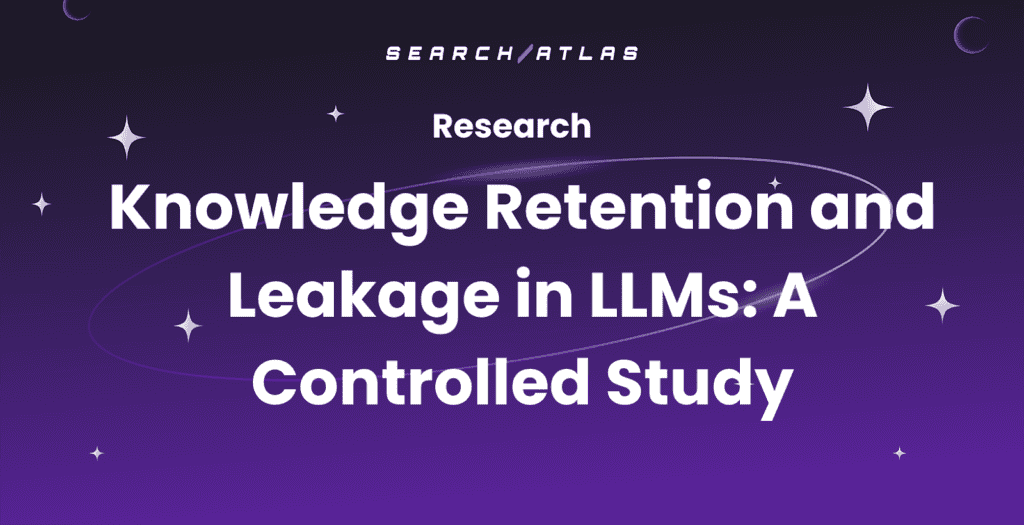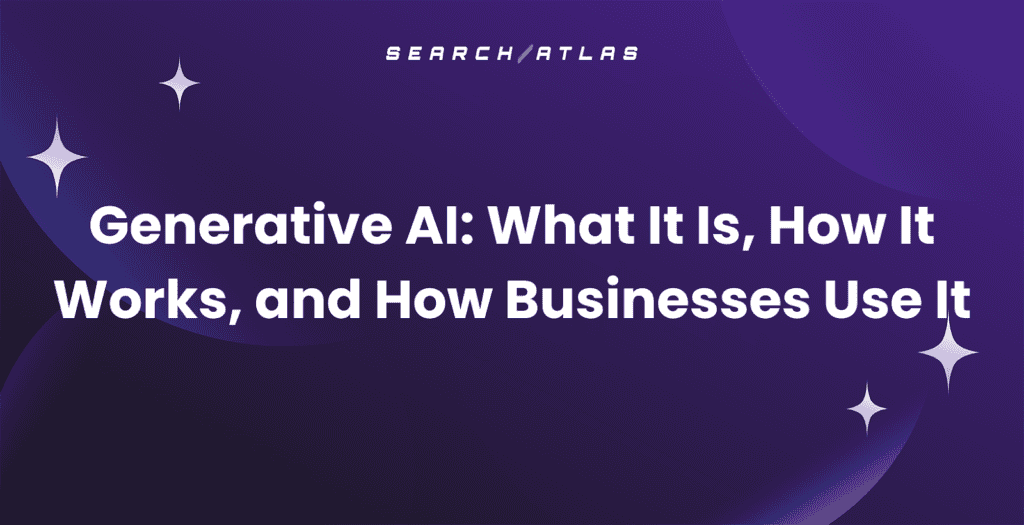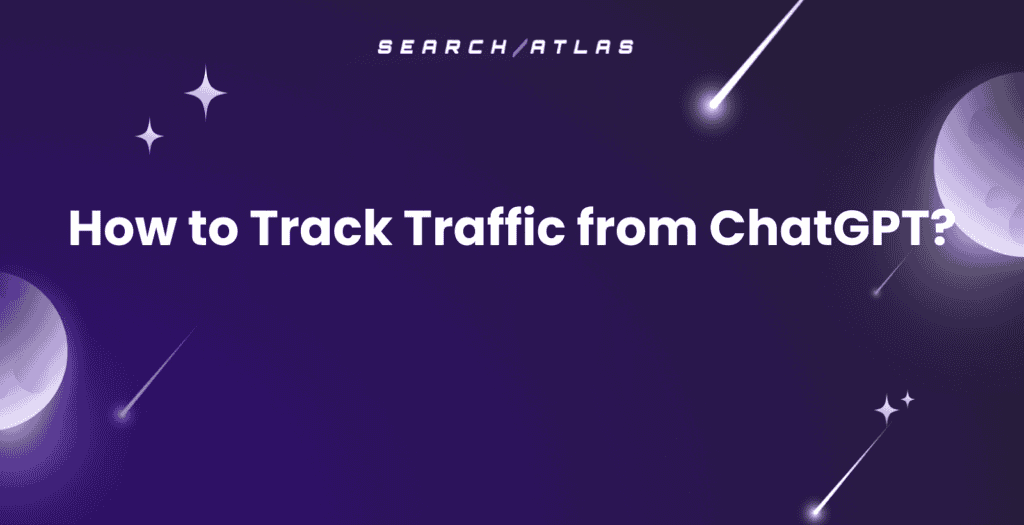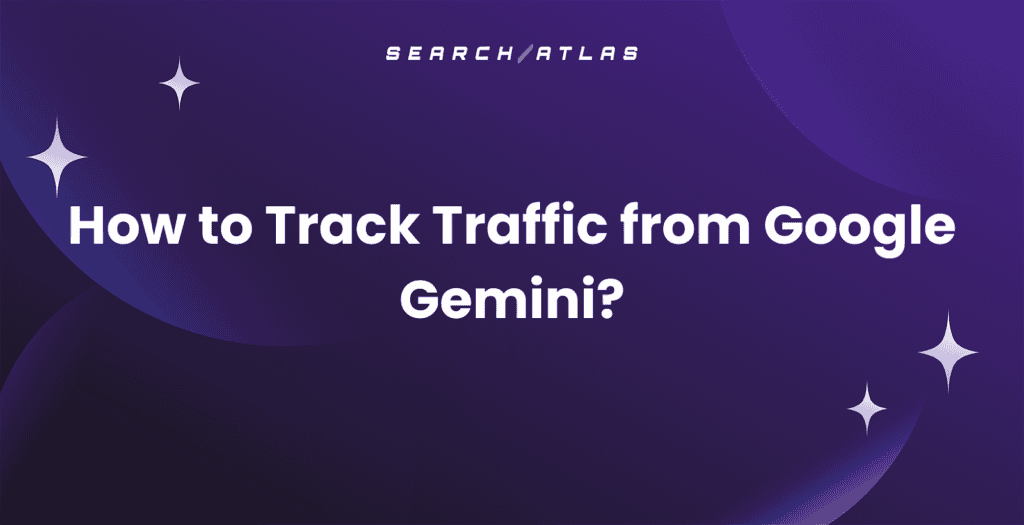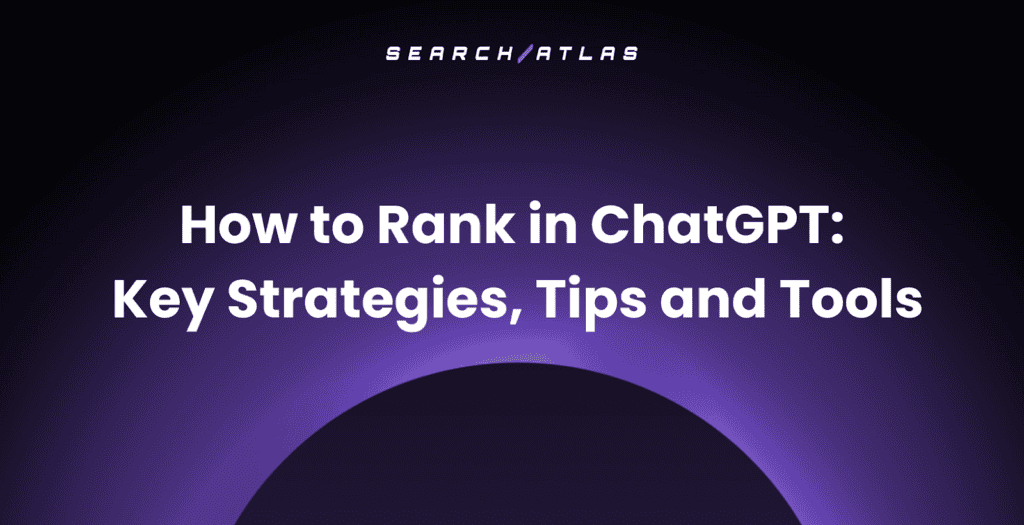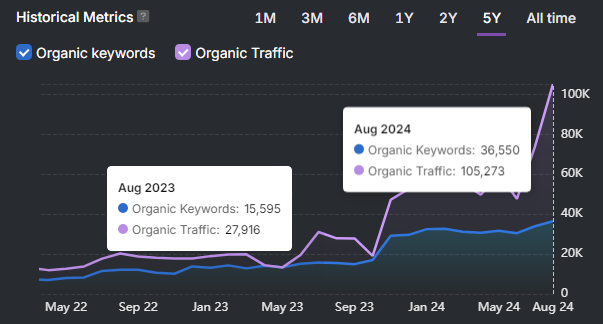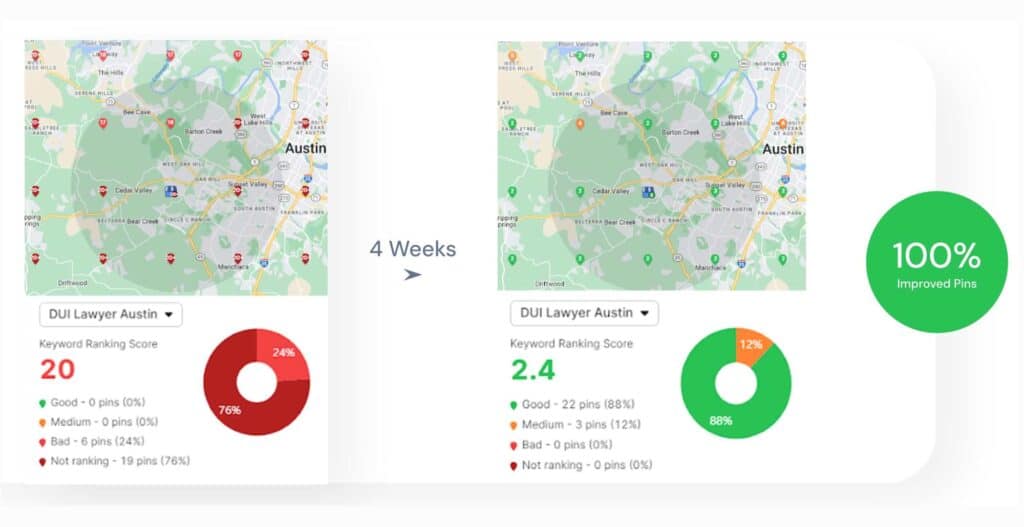Not seeing the SEO results you expected? That’s a common challenge many marketers face after covering the basics and still feeling stuck. Quick SEO Wins offer a faster path to real progress with small, strategic actions that bring noticeable results without needing to rebuild your entire site.
In 2025, the search landscape rewards agility and precision. With so much competition for visibility, every smart move counts. These wins help you take advantage of what’s already working and turn it into something greater through focused, low-effort optimization.
This article brings you 12 quick SEO wins that actually help you rank with clear steps you apply right now to boost your performance and get ahead.
What Are Quick SEO Wins?
Quick SEO wins are small, fast actions that improve search performance. These include simple fixes, updates, or optimizations that require little time to complete. Teams often use these actions early in a campaign to show progress while building long-term strategies.
What Are the 5 Best Situations for Quick SEO Wins?
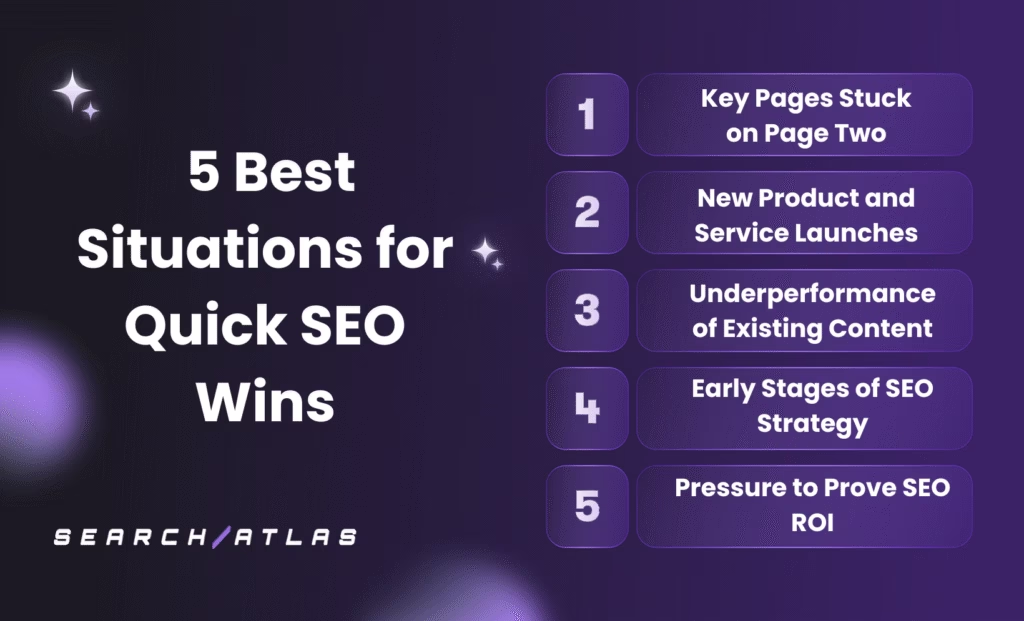
Quick SEO wins become especially valuable in moments that call for fast validation, course correction, or renewed momentum. These 5 situations below represent common points where small actions support broader goals.
1. Key Pages Stuck on Page Two: Pages that land just outside the first page often signal near-misses. They already show promise and need only minor adjustments to break into top results where traffic increases significantly.
2. New Product or Service Launches: New offerings often go live before SEO fully supports them. These pages need fast visibility to back marketing efforts, which make them perfect candidates for quick improvements in indexing, relevance, and reach.
3. Underperformance of Existing Content: Pages with low engagement, weak rankings, or thin content often signal missed opportunities. Targeted updates restore performance without requiring long rewrites or new content creation.
4. Early Stages of SEO Strategy: Early SEO efforts sometimes feel invisible while long-term strategies take shape. Quick wins give early traction, which helps support visibility while the larger plan continues in parallel.
5. Pressure to Prove SEO ROI. Fast results help prove SEO value to stakeholders. In moments where early proof is needed, quick wins offer visible progress, strengthen buy-in, and support continued investment.
12 Quick SEO Wins to Rank Faster with Less Effort
You don’t need complex strategies to climb the rankings. We have listed 12 quick SEO wins that deliver faster results with minimal effort.
1. Implement Schema Markup to Enhance Search Visibility
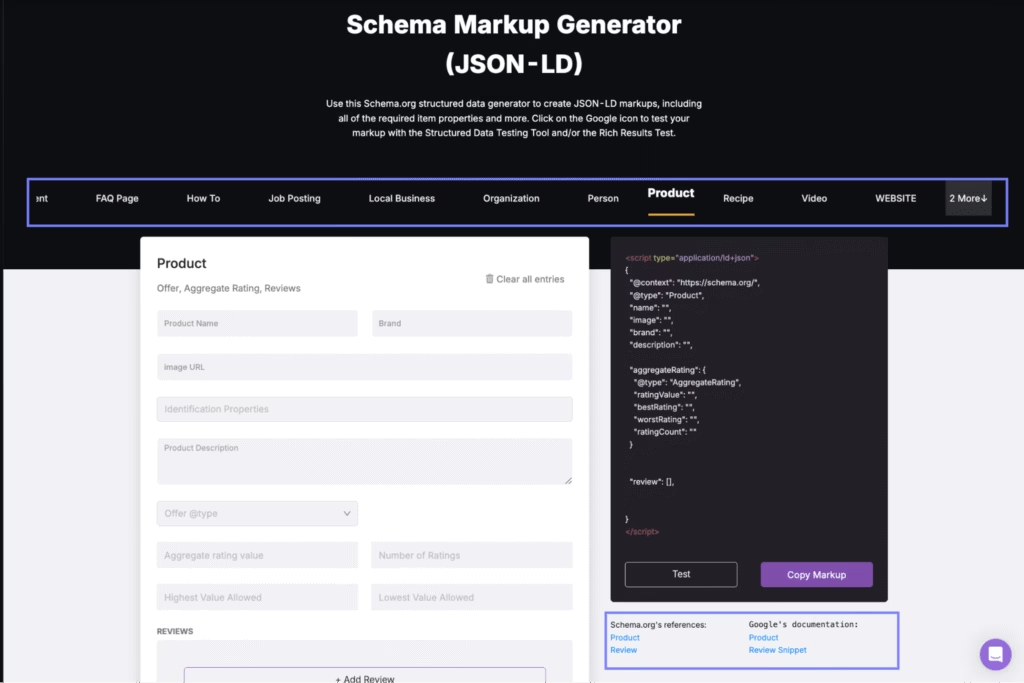
Structured data helps search engines read and interpret pages more accurately. It introduces additional context, which allows search listings to include visual elements such as ratings, pricing, or FAQs that make results more noticeable and useful.
To earn a quick SEO win, apply markup to existing pages without changing the core content. Enhanced snippets improve visibility and often lead to higher click-through rates.
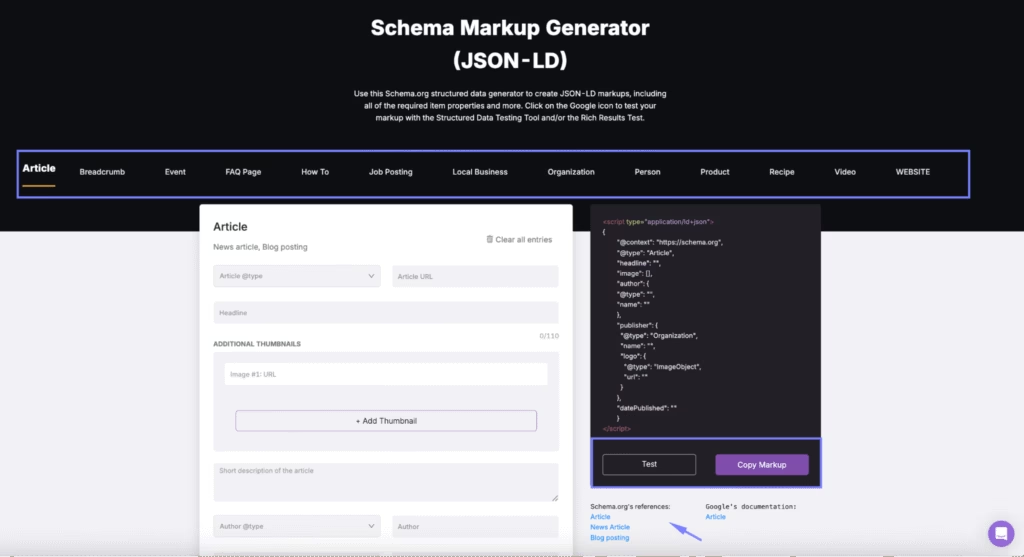
To simplify the process, use a schema markup generator. Choose a content type, complete the fields, copy the code, and add it to your page. After publishing, test the page using Google’s Rich Results Test to confirm eligibility and ensure proper implementation.
2. Improve Website Speed to Reduce Bounce Rates
Slow-loading pages often drive visitors away before they engage. High bounce rates reflect poor user experience, which search engines factor into rankings. A faster site delivers a smoother journey, encourages longer visits, and supports stronger visibility.
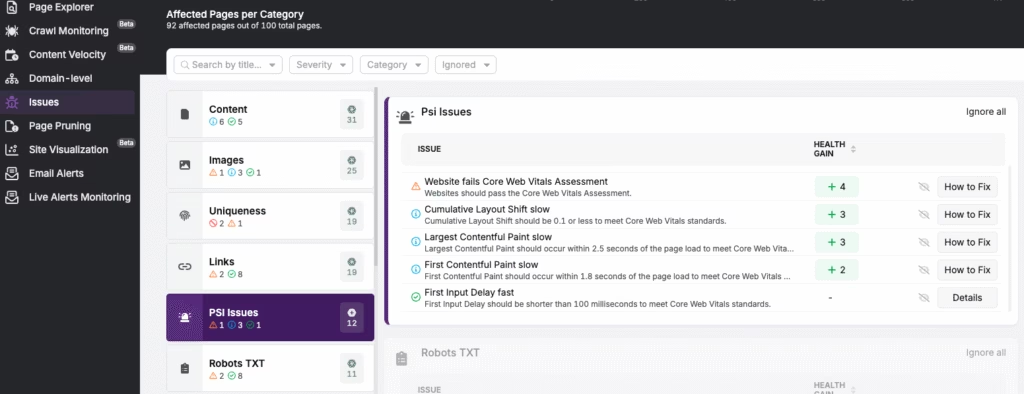
Begin with a page speed analysis to identify what’s slowing your site down. Use SEO audit tools to uncover performance issues like bloated assets, unused scripts, or outdated file formats.
Visual content is the main cause of slow pages. Resize and compress large images with tools like TinyPNG or ImageOptim. Use PNG for simple graphics that don’t need much detail. Give videos equal attention by lowering bit rates and converting to lighter formats.
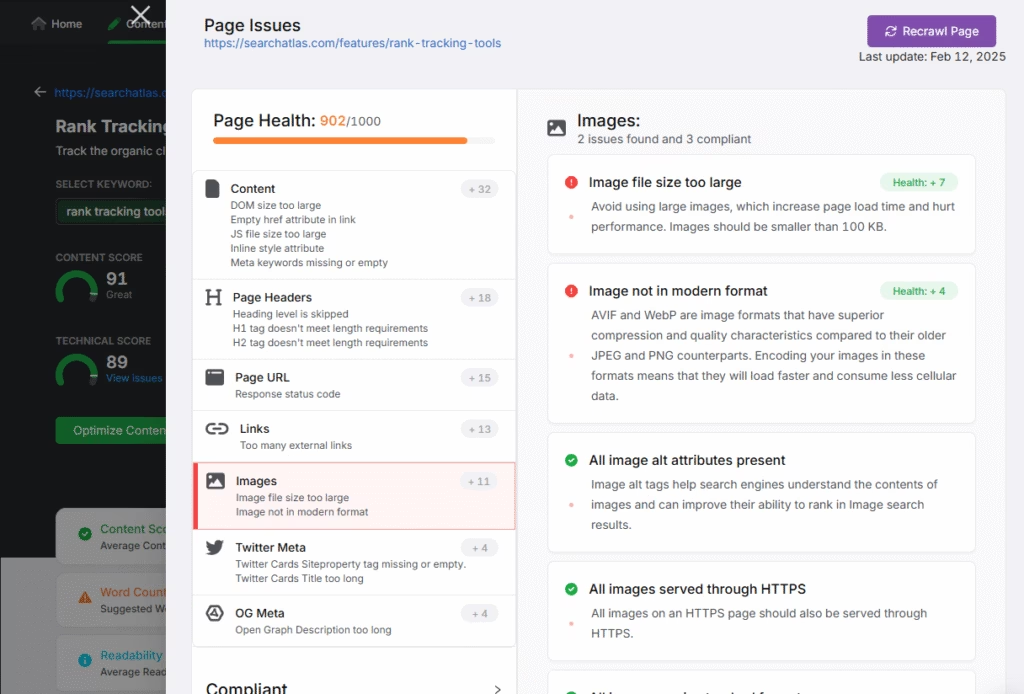
Run an On-Page Audit to finalize the process. The report will guide next steps, which offers file-level recommendations to reduce bulk and ensure the site runs as efficiently as possible.
3. Fix Broken Links to Maintain Site Health
Broken links frustrate users and signal poor maintenance to search engines. They lead to 404 errors, increase bounce rates, and hurt your site’s credibility. The most common causes of broken links are listed below.
- Content removal or relocation leads to dead ends when links aren’t updated.
- URL structure changes break links if folder paths or slugs are modified.
- External page deletions cause link rot as other sites remove or move content.
- Server or protocol errors prevent access due to 500 responses or blocked HTTP links.
- Redirect chains and loops create delays or infinite cycles that block the destination.
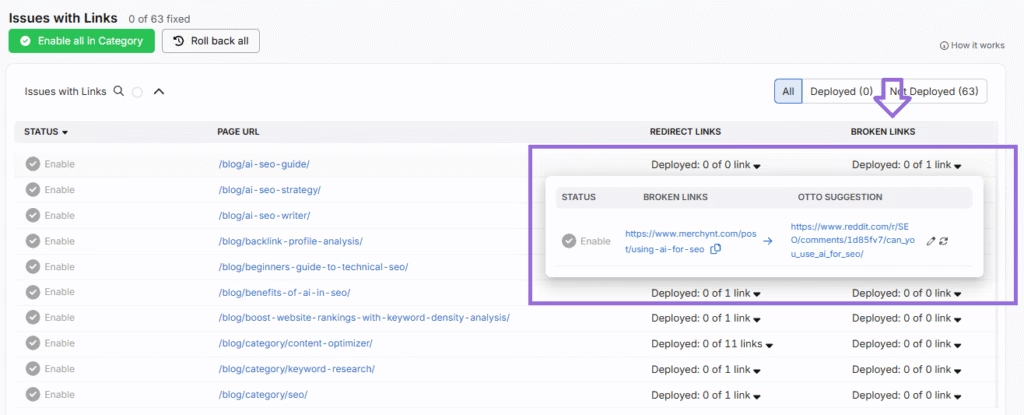
To fix broken links, update outdated URLs, set up relevant redirects, or remove links with no useful destination. OTTO SEO, the AI assistant in Search Atlas, detects broken links across your site and accelerates the process of locating and resolving each issue.
4. Automate Link Building to Scale Authority Efforts
Automated link building offers a fast way to gain momentum in search without relying on slow, manual outreach. It delivers early wins by streamlining prospecting, outreach, and follow-ups.
To support this workflow, use backlink analyzer tools that uncover link opportunities with minimal effort. These tools reveal link strength, competitor sources, and new placements that match your content focus.
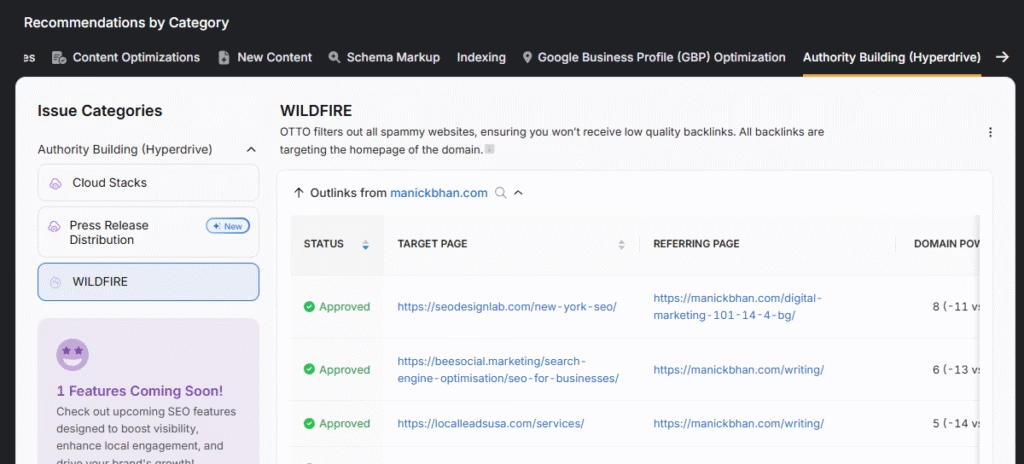
To scale results even faster, use WILDFIRE, powered by OTTO SEO. This automated backlink exchange connects with vetted websites in your niche. For every two outbound links you place, the system returns one inbound link from a trusted source.
5. Evaluate Topical Relevance to Strengthen Content Authority
Google now prioritizes subject depth over backlink volume. Sites that build coverage around a full topic cluster often outrank larger competitors. Broad topical coverage shows consistency, relevance, and expertise within a niche. To strengthen your own authority, follow the tips below.
- Identify your Current Ranking Terms. Pull keywords that already bring traffic and group them by topic.
- Compare Against a Full Topic Cluster. Map your current keywords against semantically related terms that define your subject area.
- Locate Gaps in Coverage. Highlight important terms your competitors rank for but your pages ignore.
- Fill the Missing Pieces. Create or expand content to address those gaps and complete your topical presence.
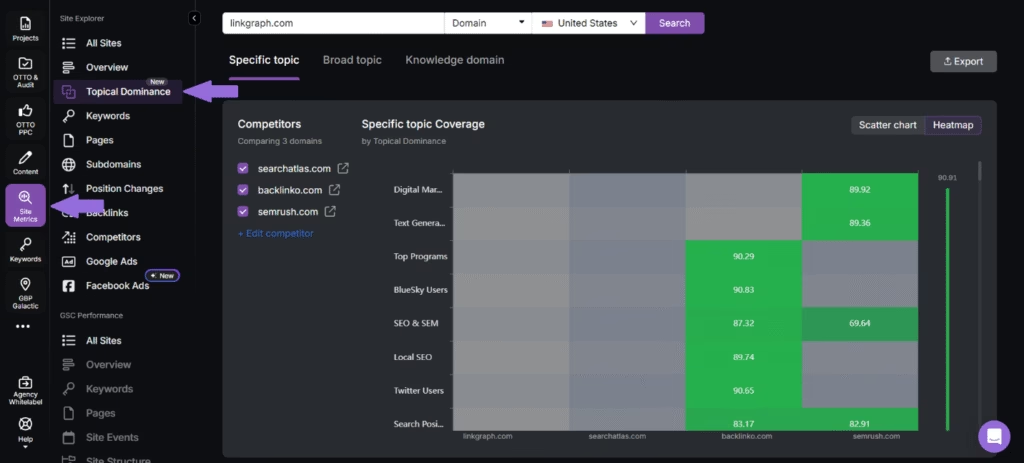
Search Atlas includes a Topical Dominance tool designed for this purpose. It compares your performance to competitors, surfaces weak points, and highlights new terms worth targeting. The tool accelerates topical authority growth by identifying high-impact areas for expansion.
6. Fix Cannibalized Keywords to Boost Page Performance
Keyword cannibalization occurs when multiple pages compete for the same term. This overlap splits ranking signals, creates confusion for search engines, and reduces visibility across your site.
Assigning a unique keyword to each page resolves the conflict. Rankings become more stable, search engines understand page intent more clearly, and users reach the content that best matches their needs.
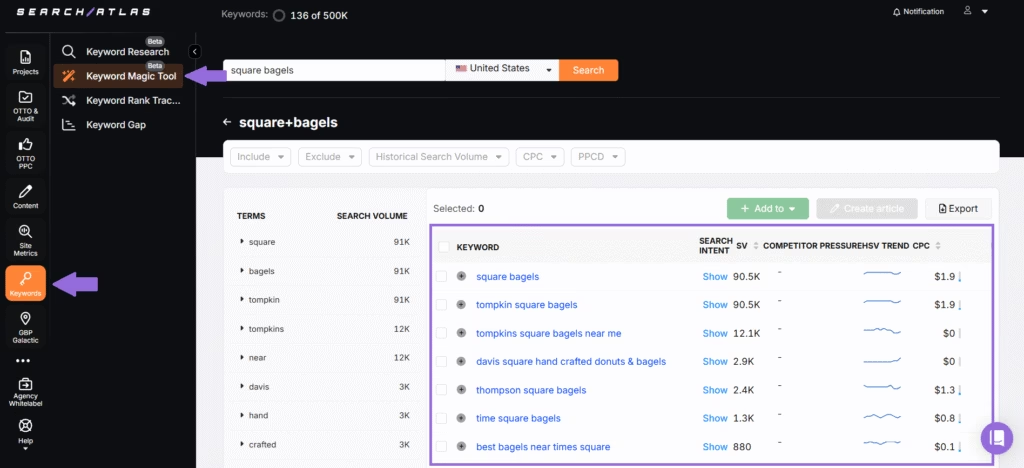
Tools like Keyword Magic simplify this by surfacing semantically related terms that keep your content aligned without repeating the same intent. Replacing duplicates with variations, supporting phrases, and context-based questions builds a cleaner, more focused signal.
7. Plan Content Strategically to Match Search Intent
Content ranks faster when it supports a clear intent such as learning, comparing, or navigating to a specific solution. Matching the topic with that purpose improves clarity and performance.
Content planning tools help organize this process. They group keywords by intent, suggest relevant topics, and build outlines based on how people actually search. Writers focus on execution instead of guessing what to include.
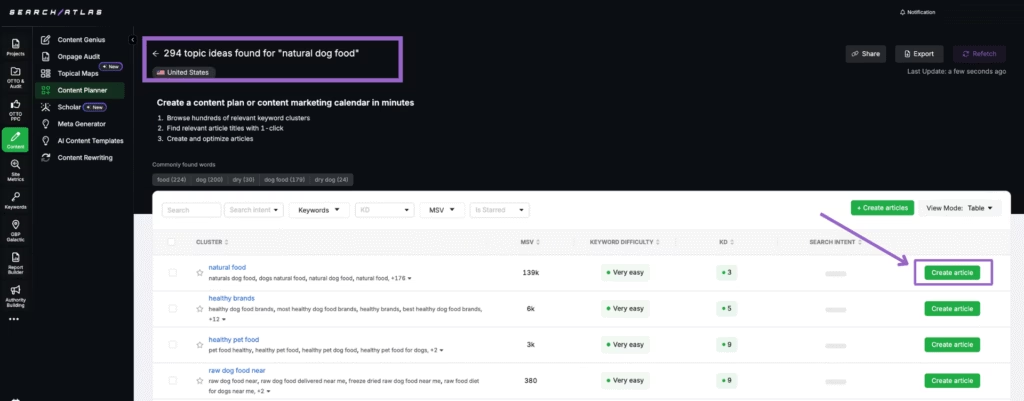
Search Atlas Content Planner stands out in this area. It finds related topics, forms tight content clusters, and generates a full article draft in one click based on real query patterns. Each article moves efficiently from idea to publication.
This structure meets user needs, the message stays focused, and the process avoids wasted time on rewrites, which makes it perfect for a quick SEO win.
8. Update Outdated Content to Regain Organic Traffic
Pages often lose traffic as information becomes stale, formatting falls behind user expectations, or competitors publish stronger alternatives. Refreshing this content helps restore rankings faster than creating something new from scratch.
Focus on pages that performed well in the past but show recent drops in visibility. Review structure, clarity, and alignment with current search behavior. Prioritize updates that match how people search today.
- Add relevant examples to improve usefulness.
- Replace outdated statistics or references.
- Expand thin sections with richer, more actionable details.
- Refine formatting to enhance readability across devices.
- Include emerging keywords closely related to the topic.
- Remove parts that no longer serve the user intent.
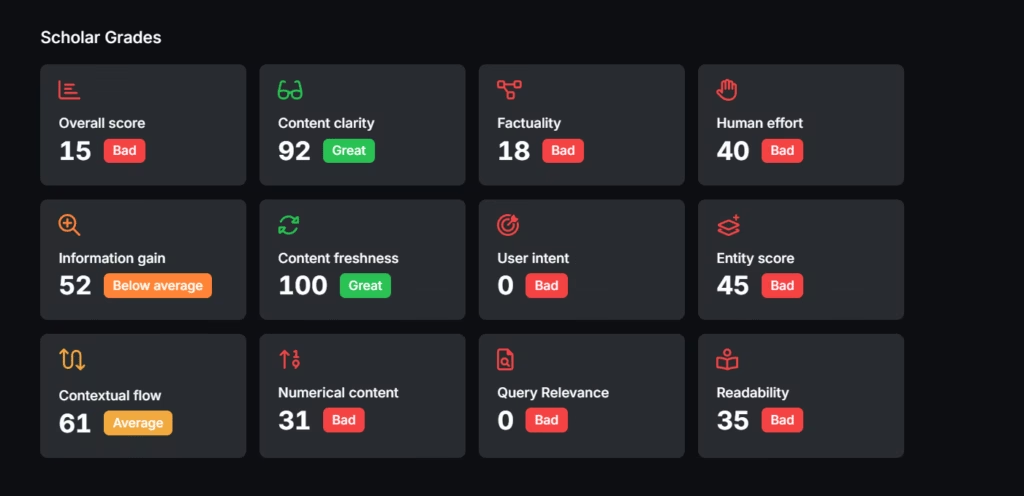
Use SEO scoring tools like Scholar to identify weaknesses. Scholar applies AI-driven criteria based on Google ranking signals, assessing structure, keyword use, semantic coverage, and overall flow to deliver a clear content readiness score.
Once gaps are identified, apply improvements using AI content writing tools. These tools suggest keywords, internal links, and structured outlines to match user intent and refresh large-scale content efficiently, without starting from zero.
9. Refine Titles and Meta Descriptions to Maximize Click-Through Rates
Meta titles and descriptions shape how your pages appear in search and impact click-through rates. Without a custom description, Google generates one, but it often overlooks your most compelling points.
Custom meta tags give you control over how your content appears in the SERPs. Titles and descriptions guide indexing and communicate relevance to users scanning for the best result. High-performing meta content follows key guidelines.
- Match search intent with relevant terms.
- Highlight the main benefit or outcome.
- Use clear, direct language that encourages clicks.
- Keep within optimal length to avoid cut-offs.
- Avoid repeating meta tags across multiple pages.
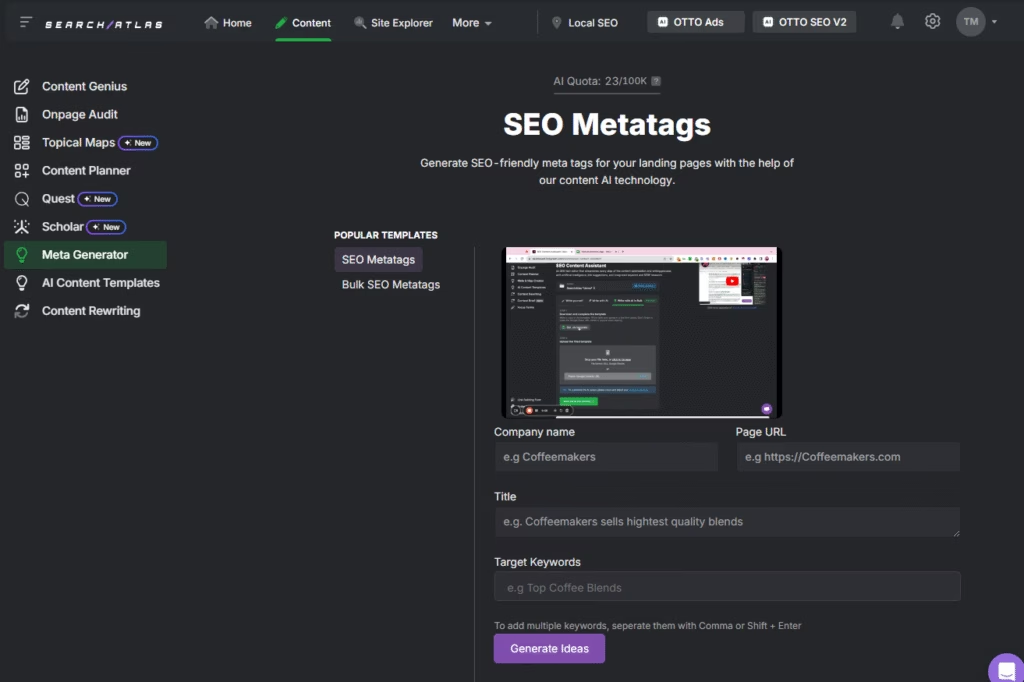
Rely on a Meta Generator tool to create optimized titles and descriptions for individual or multiple pages. These platforms apply SEO guidelines automatically and tailor suggestions based on keyword context.
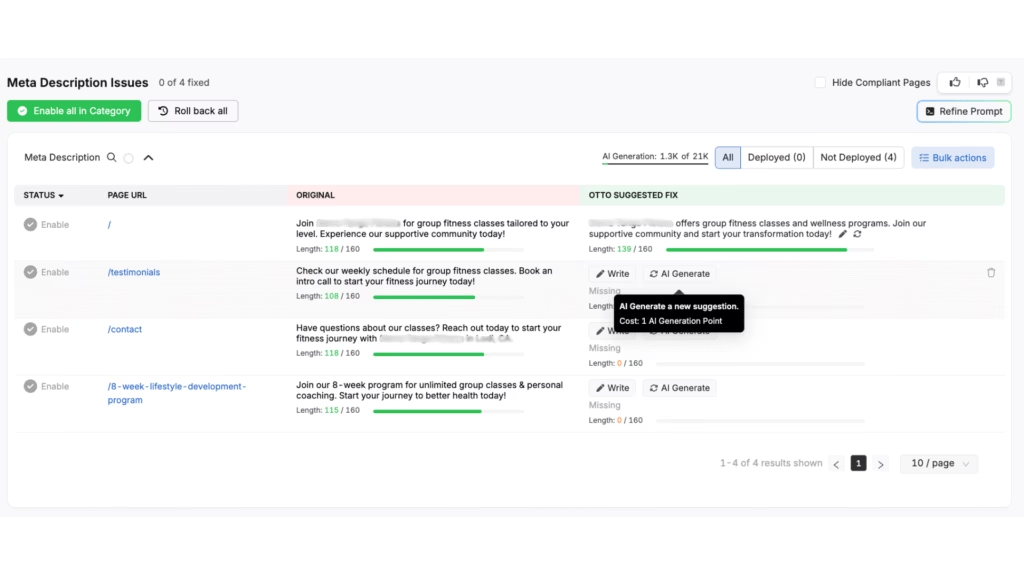
For quick issue detection and instant edits, use OTTO SEO. It spots issues, suggests edits, and allows instant updates directly in the dashboard.
10. Restructure Internal Links to Enhance Site Navigation and SEO
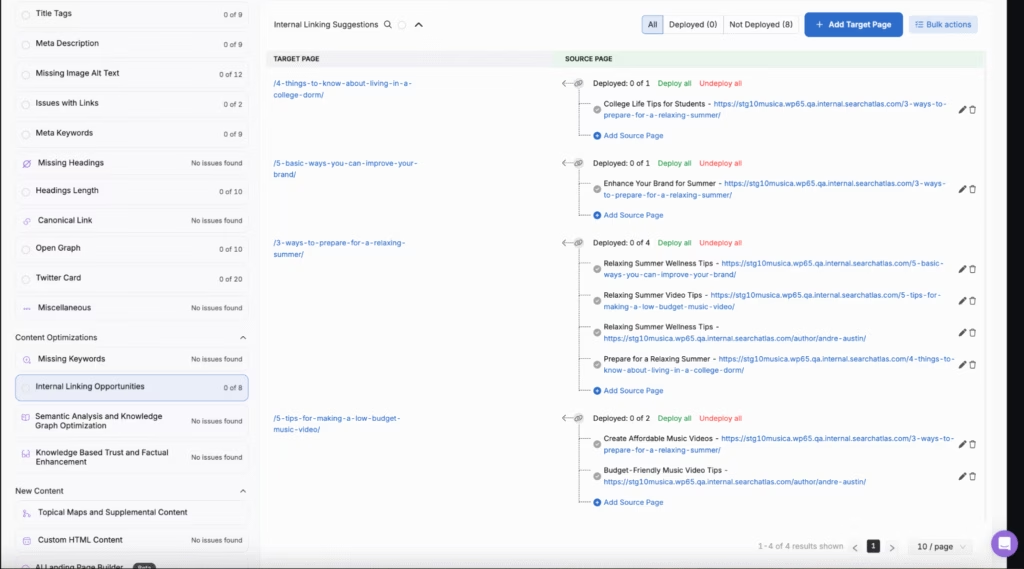
Well-structured internal links guide users, help search engines understand your site, and ensure your most valuable pages get seen. Automation tools simplify internal linking by scanning site architecture, identifying missed opportunities, and suggesting relevant connections. These tools speed up updates without disrupting your content strategy.
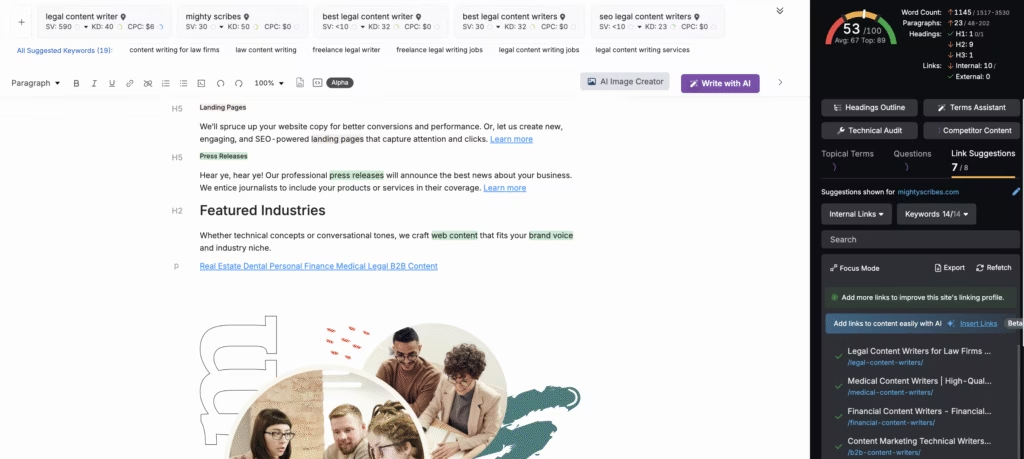
Include internal linking early in the writing process using Content Genius, the AI writer. It maps relevant internal links directly into your draft, recommends context-specific targets, and connects related subtopics to enhance depth.
11. Add a FAQ Section to Rank for Question-Based Queries
Instead of building new pages, repurpose existing knowledge into a FAQ section with concise answers that target common long-tail queries. FAQs expand keyword coverage, strengthen topical relevance, and improve user experience by delivering direct, useful information.
Pull questions from keyword tools, customer feedback, or related search suggestions. Keep answers clear, structured, and focused on what users want to know.
12. Use AI SEO Agent
One of the most effective quick SEO wins is removing manual effort from repetitive tasks. An AI SEO agent accelerates performance by identifying gaps, applying updates, and coordinating SEO actions across your site, Google Search Console (GSC) and Google Business Profile (GBP).
OTTO SEO, the AI assistant behind Search Atlas, handles content creation, technical fixes, internal linking, on-page adjustments, press release distribution, and backlink building, automatically and at scale.
It updates title tags, meta descriptions, canonical tags, and fixes broken links in the background. Local SEO tasks stay covered as well, which includes GBP optimization, review responses, and refreshed Q&A sections to improve local visibility.
Teams move faster and accomplish more with less work. With thousands of actions executed at once, an AI SEO agent transforms slow processes into rapid, measurable growth. 📈
Win Faster with Fully Automated SEO in One Platform
Quick SEO wins prove that strong results do not always require heavy lifting or long timelines. To unlock even more impact, automation helps turn those early gains into lasting performance.
Search Atlas delivers fast execution with built-in strategy. It combines keyword research, content creation, on-page optimization, internal linking, and publishing in one AI-powered platform.
For quick wins that lead to lasting impact, nothing matches the power and precision of Search Atlas. Start your free trial today and experience the full platform in action. ⚡




